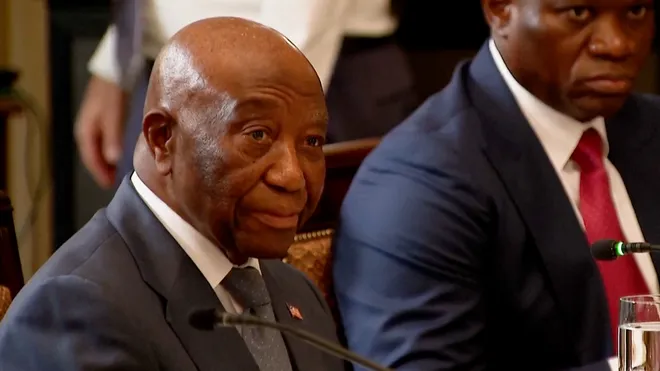Liberians outraged after Trump praises Boakai’s english in apparent diplomatic misstep

Liberians have expressed widespread indignation following remarks made by former U.S. President Donald Trump during a high-profile meeting at the White House, in which he praised Liberian President Joseph Boakai’s command of the English language—seemingly unaware that English has been the official language of Liberia since the 19th century.
The comments were made during a summit held in Washington with five West African leaders—representing Gabon, Guinea-Bissau, Liberia, Mauritania, and Senegal.
In what many saw as a condescending moment, Trump commended Boakai’s “eloquence” and English pronunciation, prompting backlash in Liberia and across African diplomatic circles.
Critics argue the incident highlights a broader issue of Western ignorance and paternalism toward Africa.
“This only proves once again that the West doesn’t take us seriously as Africans,” said Foday Massaquio, leader of Liberia’s opposition Congress for Democratic Change–Council of Patriots.
“Trump was incredibly disrespectful to an African leader.”
The President’s Office in Monrovia, however, attempted to downplay the controversy.
Boakai’s spokesperson, Kula Fofana, told the Associated Press, “What’s important is that the media focus on the substantive discussions of the meeting.”
Still, the episode has reignited concerns in Liberia over the state of relations with the United States.
The controversy comes amid growing anxiety following the recent dissolution of USAID operations in the country—a major blow, as American assistance has historically accounted for nearly 2.6% of Liberia’s gross national income, the highest such ratio globally according to the Center for Global Development.
Liberia, founded in the 1800s by freed African-American slaves, has long shared deep cultural and historical ties with the United States.
The streets of Monrovia are dotted with familiar American iconography—New York-style taxis, yellow school buses, and even street signs that mirror those found across the U.S.
While many found Trump’s remarks offensive, others viewed them as consistent with his idiosyncratic diplomatic style.
“To some, the comment may come across as patronizing, echoing a longstanding Western tendency to express surprise when African leaders show intellectual fluency,” said Abraham Julian Wennah, Research Director at the African Methodist Episcopal University.
“In post-colonial contexts, language has often been weaponized to undermine legitimacy and competence.
But if we consider Trump’s rhetorical style, his comments were likely meant as a compliment—a recognition of Boakai’s poise and readiness for global engagement,” he added.
Regardless of intent, the remarks have sparked a renewed dialogue about dignity, diplomacy, and the need for mutual respect in international relations.
About The Author
dailymailafric
I am an avid African news observer, and an active member of Daily Mail Africa.
I’m Passionate about staying informed on diverse topics across the continent,
I actively contribute to publishing on political, economic and cultural developments in Africa.



